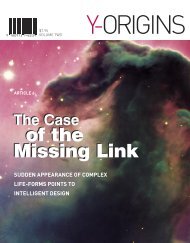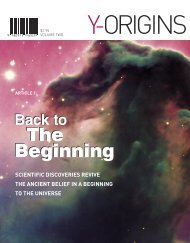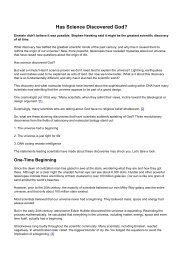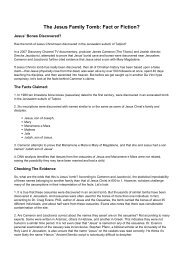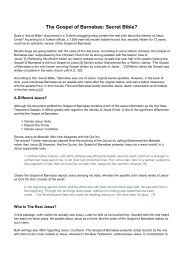Create successful ePaper yourself
Turn your PDF publications into a flip-book with our unique Google optimized e-Paper software.
Did Jesus Claim to be God?<br />
Did Jesus really claim to be God, or is that belief a misunderstanding of his words? Some words Jesus spoke<br />
reflect his humility as a servant and his limitations as a man. However, on other occasions Jesus made claims<br />
that only God could make.<br />
Jesus didn’t parade around the hills of Judea shouting, “Hey everybody, look at me – I’m God!” On the other<br />
hand, neither did he go around proclaiming, “I am a teacher,” I am a prophet,” or, “I am the Messiah.” Yet his<br />
followers called him by each of those names. They also called him, “Lord.”<br />
After the apostles died, several first and second century church leaders wrote of Jesus’ deity. In fact, early church<br />
historian Larry Hurtado states, that from the very beginning of the church Jesus was worshipped as Lord along<br />
with God the Father.[1]<br />
But what did Jesus Christ say about himself? What did Jesus mean by the terms, “Son of Man,” and “Son of<br />
God?” If Jesus wasn’t God, why did his enemies accuse him of “blasphemy?” More importantly, if Jesus wasn’t<br />
God, why did he accept worship?<br />
From Creator To Carpenter?<br />
According to the New Testament, God came to earth in the Person of His Son, Jesus Christ.[2] The Bible teaches<br />
that Jesus is not a created being like the angels, but is the very Creator of the universe.[3] As theologian J. I.<br />
Packer writes, “The gospel tells us that our Creator has become our Redeemer.”[4]<br />
The New Testament reveals that, in accordance with his Father’s will, Jesus temporarily set aside his power and<br />
glory to become a tiny helpless baby. As he grew, Jesus worked in a carpenter shop, experienced hunger, got<br />
tired, and suffered pain and death like us. Then at age 30 he began his public ministry.<br />
One God<br />
The Bible reveals God as the Creator of the universe. He is infinite, eternal, all powerful, all-knowing, personal,<br />
righteous, loving, just, and holy. He created us in His image, and for His pleasure. According to the Bible, God<br />
made us to have an eternal relationship with Himself.<br />
When God spoke to Moses at the burning bush 1500 years before Christ, He reaffirmed that He is the only God.<br />
God told Moses His name is Yahweh, (I AM). (Most of us are more familiar with the English translation, Jehovah<br />
or LORD.)[5] At the time of Christ, each worship service began with a recitation of the Shema.[6]<br />
“Hear, O Israel: the LORD our God is one LORD.” (Deuteronomy 6:4)<br />
It is in this world of monotheistic belief that Jesus entered into, ministered in, and began making claims that<br />
astounded all who heard them.<br />
And according to Ray Stedman, Jesus is the central theme of the Hebrew Scriptures.<br />
“Here, in the form of a living, breathing human being, is the one who satisfies and fulfills all the symbols and<br />
prophecies of Genesis through Malachi. As we move from the Old Testament to the New, we find that one person,<br />
Jesus of Nazareth, is the focal point of both Testaments.”[7]<br />
But if Jesus is the fulfillment of the Old Testament, his claims should confirm that “God is one LORD,” beginning<br />
with what he called himself. Let’s look further.<br />
God’s Sacred Name
When Jesus began his ministry, his miracles and radical teaching immediately drew huge crowds, creating a<br />
frenzy of excitement. As his popularity swelled with the masses, the Jewish leaders (Pharisees, Sadducees, &<br />
Scribes) began to see Jesus as a threat. Suddenly they began looking for ways to trap him.<br />
One day Jesus was debating some Pharisees at the Temple, when suddenly he told them he is “the light of the<br />
world.” It is almost bizarre to picture this scene, where a traveling carpenter from the lowlands of Galilee tells<br />
these PhDs in religion that he is “the light of the world?” Believing that Yahweh is the light of the world, they<br />
replied indignantly:<br />
“You are making false claims about yourself” (John 8:13 NLT).<br />
Then Jesus told them that, 2,000 years earlier, Abraham had foreseen him. Their response was incredulous:<br />
“You aren’t even fifty years old. How can you say you have seen Abraham? ” (John 8:57 NLT)<br />
Then Jesus shocked them even more:<br />
“The truth is, before Abraham was, I AM.” (John 8:58 NLT)<br />
Out of the blue, this maverick carpenter with no degree in religion claimed to eternal existence. Furthermore, he<br />
had used the I AM title (ego eimi),[8] the sacred Name of God for Himself! These religious experts lived and<br />
breathed the Old Testament Scriptures declaring Yahweh alone as God. They knew the Scripture spoken through<br />
Isaiah:<br />
“I alone am God. There is no other God; there never has been and never will be. I am the Lord, and there<br />
is no other Savior.” Isaiah 43:10, 11 NLT)<br />
Since the penalty for blasphemy was death by stoning, the Jewish leaders angrily picked up stones to kill Jesus.<br />
They thought Jesus was calling himself, “God.” At that point Jesus could have said, “Wait! You misunderstood<br />
me—I am not Yahweh.” But Jesus didn’t alter his statement, even at the risk of being killed.<br />
C.S. Lewis explains their anger:<br />
“He says…’I am begotten of the One God, before Abraham was, I am,’ and remember what the words ‘I<br />
am’ were in Hebrew. They were the name of God, which must not be spoken by any human being, the<br />
name which it was death to utter.”[9]<br />
Some may argue that this was an isolated instance. But Jesus also used “I AM” for himself on several other<br />
occasions. Let’s look at some of these, trying to imagine our reactions upon hearing Jesus’ radical claims:<br />
“I am the light of the world” (John 8:12)<br />
“I am the way, the truth and the life” (John 14:6)<br />
“I am the only way to the Father” (John 14:6)<br />
“I am the resurrection and the life” (John 11:25)<br />
“I am the Good Shepherd” (John 10:11)<br />
“I am the door” (John 10:9)<br />
“I am the living bread” (John 6:51)<br />
“I am the true vine” (John 15:1)<br />
“I am the Alpha and Omega” Rev.1:7,8)
As Lewis observes, if these claims were not from God Himself, Jesus would have been deemed a loony. But what<br />
made Jesus credible to those who heard him were the creative miracles he performed, and his wise authoritative<br />
teaching.<br />
Son of Man<br />
Some say that Jesus didn’t intend the name I AM to mean he is God. They argue that Jesus’ reference to<br />
himself as the “Son of Man,” proves he didn’t claim divinity. So what is the context of the title, “Son of Man,” and<br />
what does it mean?”<br />
Packer writes that the name, “Son of Man” referred to Jesus’ role as Savior-King, fulfilling the messianic<br />
prophecy of Isaiah 53.[10] Isaiah 53 is the most comprehensive prophetic passage of the coming Messiah, and<br />
clearly depicts him as the suffering Savior. Isaiah had also referred to the Messiah as “Mighty God,” “Everlasting<br />
Father,” Prince of Peace” Isaiah 9:6).<br />
Additionally, many scholars say Jesus was referring to himself as the fulfillment of Daniel’s prophecy about the<br />
“son of man.” Daniel prophesies that the “son of man” will be given authority over mankind and receive worship:<br />
“I looked, and there before me was one like a son of man, coming with the clouds of heaven. He<br />
approached the Ancient of Days and was led into his presence. He was given authority, glory and<br />
sovereign power; all peoples, nations and men of every language worshipped him.” (Daniel 7:13, 14)<br />
So who is this “son of man,” and why is he being worshipped, when God alone is to be worshipped. Jesus told<br />
his disciples that when he returns to earth, ”Then everyone will see the Son of man arrive on the clouds with<br />
power and great glory” (Luke 21:27). Is Jesus saying here that he is the fulfillment of Daniel’s prophecy?<br />
Son of God<br />
Jesus also claimed to be the, “Son of God.” This title does not mean Jesus is God’s biological Son. Neither does<br />
the term “Son” imply inferiority anymore than a human son is inferior in essence to his father. A son shares his<br />
father’s DNA, and although he is different, they are both men. Scholars say that the term “Son of God” in the<br />
original languages refers to likeness, or “of the same order.” Jesus meant by it that he has divine essence, or in<br />
21st century terms, the “DNA of God”. Professor Peter Kreeft explains.<br />
“What did Jesus mean when he called himself the ‘Son of God’? The son of a man is a man. (Both ‘son’<br />
and ‘man,’ in the traditional language, mean males and females equally.) The son of an ape is an ape.<br />
The son of a dog is a dog. The son of a shark is a shark. And so the Son of God is God. ‘Son of God’ is a<br />
divine title.”[11]<br />
In John 17, Jesus speaks about the glory he and his Father shared before the world began. But by calling himself<br />
the “Son of God” is Jesus claiming equality with God? Packer answers:<br />
When, therefore, the Bible proclaims Jesus as the Son of God, the statement is meant as an assertion of<br />
his distinct personal deity.”[12]<br />
Thus, the names Jesus used for himself point to the fact that he was claiming equality with God. But did Jesus<br />
speak and act with the authority of God?<br />
Forgiving Sin<br />
In the Jewish religion, forgiveness of sin was reserved for God alone. Forgiveness is always personal; someone
else cannot do the forgiving for the person offended, especially if the Person offended is God. But on several<br />
occasions Jesus acted as if he was God by forgiving sinners. The simmering religious leaders finally erupted at<br />
Jesus when he forgave the sins of a man with palsy right in front of them.<br />
“The scribes who heard him said blasphemy! Who but God can forgive sins!” (Mark 2:7)<br />
Lewis imagines the stunned reactions of all those who heard Jesus:<br />
‘Then comes the real shock,’ wrote Lewis: ‘Among these Jews there suddenly turns up a man who goes<br />
about talking as if He was God. He claims to forgive sins. He says He always existed. He says He is<br />
coming to judge the world at the end of time. Now let us get this clear. Among Pantheists, like the Indians,<br />
anyone might say that he was a part of God, or one with God … But this man, since He was a Jew, could<br />
not mean that kind of God. God, in their language, meant the Being outside the world, who had made it<br />
and was infinitely different from anything else. And when you have grasped that, you will see that what this<br />
man said was, quite simply, the most shocking thing that has ever been uttered by human lips.’[13]<br />
Claiming Oneness with God<br />
Those who listened to Jesus, observed his moral perfection, and saw him perform miracles, wondered if he was<br />
the long-promised Messiah. Finally his opponents surrounded him at the Temple, asking:<br />
“How long are you going to keep us in suspense? If you are the Messiah, tell us plainly.”<br />
Jesus answered,<br />
“The proof is what I do in the name of my Father.” He compared his followers with sheep saying, “I give<br />
them eternal life, and they will never perish.” He then revealed to them that “the Father is greater than<br />
all,” and that his deeds were “at the Father’s direction.” Jesus’ humility must have been disarming. But<br />
then Jesus dropped a bombshell, telling them, (John 10:25-30)<br />
“The Father and I are one.”<br />
If Jesus had meant that he was merely in agreement with God, there would have been no strong reaction. But, the<br />
Jews again picked up stones to kill him. Jesus then asked them, “At my Father’s direction I have done many<br />
things to help the people. For which one of these good deeds are you killing me?”<br />
They replied,<br />
“Not for any good work; but for blasphemy, because you, a mere man, have made yourself God” (John<br />
10:33).<br />
As Jesus was preparing his disciples for his upcoming death on the cross and departure, Thomas wanted to know<br />
where he was going and the way there. Jesus answered Thomas:<br />
“I am the way, the truth, and the life. No one can come to the Father except through me. If you had known<br />
who I am, then you would have known who my Father is. From now on you know him and have seen<br />
him.” (John 14:5-9)<br />
They were confused. Philip then speaks up, asking Jesus to “show us the Father.” Jesus’ answers Philip with
these shocking words:<br />
“Philip, don’t you even yet know who I am, even after all the time I have been with you? Anyone who has<br />
seen me has seen the Father!”<br />
In effect Jesus was saying, “Philip if you want to see the Father, look at me!” In John 17 Jesus reveals that this<br />
oneness with his Father had existed in eternity past, “before the world began.” According to Jesus, there has<br />
never been a time when he did not share God’s very glory and essence.<br />
God’s Authority<br />
The Jews always regarded God as the ultimate authority. Authority was a well understood term in<br />
Roman-occupied Israel. At that time, Caesar’s edict could instantly launch legions into war, condemn or exonerate<br />
criminals, and establish laws and rules of government. In fact, Caesar’s authority was such that he himself<br />
claimed divinity.<br />
Prior to leaving earth, Jesus explained the scope of his authority:<br />
“Jesus said, ‘I have been given complete authority in heaven and on earth’” (Matthew 28:18, NLT).<br />
In these remarkable words, Jesus is claiming to be the supreme authority, not just on earth, but in heaven also.<br />
John Piper observes,<br />
“This is why Jesus’ friends and enemies were staggered again and again by what he said and did. He<br />
would be walking down the road, seemingly like any other man, then turn and say something like, ‘Before<br />
Abraham was, I am.’ Or, ‘If you have seen me, you have seen the Father.’ Or, very calmly, after being<br />
accused of blasphemy, he would say, ‘The Son of Man has authority on earth to forgive sins.’ To the<br />
dead he might simply say, ‘Come forth,’ or, ‘Rise up.’ And they would obey. To the storms on the sea he<br />
would say, ‘Be still.’ And to a loaf of bread he would say, ‘Become a thousand meals.’ And it was done<br />
immediately.”[14]<br />
Some might argue that since the authority came from his Father, it has nothing to do with Jesus being God. But<br />
God never gives His authority to a created being in order that they are to be worshipped. To do so would be to<br />
violate His Command.<br />
Accepting Worship<br />
Nothing is more fundamental to the Hebrew Scriptures than the fact that God alone is to be worshipped. In fact,<br />
the first of the Ten Commandments is,<br />
“Do not worship any other gods besides me” (Exodus 20:3 NLT).<br />
Thus, the most terrible sin a Jew could commit was to either worship another creature as God, or to receive<br />
worship. So if Jesus is not God, it would be blasphemy to receive worship.<br />
After Jesus’ resurrection, the disciples told Thomas they had seen the Lord alive (John 20:24-29). Thomas<br />
scoffed, telling them he would only believe if he could put his fingers on the nail wounds of Jesus’ hands and into<br />
his pierced side. Eight days later the disciples were all together in a locked room when Jesus suddenly appeared<br />
in front of them. Jesus looked at Thomas and told him to “Put your finger here and see my hands. Put your hand<br />
into the wound in my side.”
Thomas needed no more proof. He instantly believed, exclaiming to Jesus:<br />
“My Lord and my God!”<br />
Thomas worshipped Jesus as God! If Jesus is not God, he certainly should have reprimanded Thomas right there.<br />
But instead of reprimanding Thomas for worshipping him as God, Jesus commended him, saying:<br />
“You believe because you have seen me. Blessed are those who haven’t seen me and believe anyway.”<br />
Jesus accepted worship on nine recorded occasions. In context of Jewish belief, Jesus’ acceptance of worship<br />
speaks volumes about his claim to divinity. But it wasn’t until after Jesus ascended to heaven that his disciples<br />
fully understood. Before Jesus left earth, he told his apostles to “baptize new disciples in the name of the Father,<br />
the Son, and the Holy Spirit” (Matt. 28:19), putting both the Holy Spirit and himself on the same level as the<br />
Father.[15]<br />
Alpha and Omega<br />
While John the apostle was in exile on the Island of Patmos, Jesus revealed to him in a vision the events that will<br />
occur in the last days. In the vision, John describes the following incredible scene:<br />
“Look! He comes with the clouds of heaven. And everyone will see him – even those who pierced him … ’I am the<br />
Alpha and the Omega—the beginning and the end,’ says the Lord God. ‘I am the one who is, who always was,<br />
and who is still to come, the Almighty One.’”<br />
So who is this Person who is called “the Alpha and Omega,” “the Lord God,” “the Almighty One”? We are told<br />
that he was “pierced.” That makes it clear that the Alpha and Omega is Jesus. He is the one who was pierced on<br />
the cross.<br />
John, who was closer to Jesus than any other disciple, sees the image of the Person speaking to him. He writes:<br />
“And standing in the middle of the lampstands was the Son of Man….His head and his hair were white like wool,<br />
as white as snow. And his eyes were bright like flames of fire….And his face was as bright as the sun in all its<br />
brilliance (Rev. 1:13, 14, 16b).<br />
It is impossible to grasp John’s emotions as he sees this Person shining like the sun in full strength, with eyes like<br />
flames of fire. He immediately fell as a dead man in front of the one he saw. If this was Jesus, why didn’t John<br />
know him? Perhaps he thought it was an angel? Let’s listen to John’s words.<br />
“But he laid his right hand on me and said, ‘Don’t be afraid! I am the First and the Last. I am the living one who<br />
died. Look, I am alive forever and ever’” (Rev. 1:17)!<br />
The One talking to John identifies himself as, “the First and the Last,” a clear reference to his eternality. And<br />
since only God is eternal, this must be God. But in the same sentence he tells John that he is “the living one who<br />
died.” Thus, we know this could not be God the Father because the Father never suffered death as a man.<br />
“And I saw a great white throne, and I saw the one who was sitting on it … And the one sitting on the throne said …<br />
’I am the Alpha and the Omega – the Beginning and the End.’” (Revelation 20:11; 21:6)<br />
It is the Lord Jesus Christ who rules from the great white throne. Jesus had already told his disciples that he<br />
would be the final judge of men. He promised that those who put their trust in him would be saved from the<br />
judgment of sin, but those who reject him will be judged.<br />
But did Jesus mean that he is really God the son, and not merely a created being like a prophet or and angel?
Jesus answers that question in the next verse: “All who are victorious will inherit all these blessings, and I will be<br />
their God, and they will be my children.” (Revelation 20:7)<br />
Conclusion<br />
So did Jesus claim to be God, or was he simply misunderstood. Let’s take another look at Jesus’ claims and ask:<br />
would Jesus have made such radical claims if he was not God?<br />
Jesus used God’s Name for himself<br />
Jesus called himself “Son of Man”<br />
Jesus called himself “Son of God”<br />
Jesus claimed to forgive sin<br />
Jesus claimed oneness with God<br />
Jesus claimed all authority<br />
Jesus accepted worship<br />
Jesus called himself the “The Alpha and Omega”<br />
Jesus called himself “God”<br />
Some might say, “how can we believe Jesus’ claims? What proof did he leave?” Three days after his crucifixion,<br />
his disciples claimed they saw him alive. If their story was a hoax, it would have died out as the Romans<br />
submitted them to the most horrendous torture known to man. But their conviction and sincerity overpowered<br />
Rome and changed our world (See http://y-jesus.com/wwrj/6-jesus-rise-dead”. Lewis explains the reason for their<br />
conviction:<br />
“What is beyond all space and time, what is uncreated, eternal, came into nature, descended into His own<br />
universe, and rose again.”[16]<br />
This brilliant scholar had originally thought of Jesus as a myth, much like the man-made gods of Ancient Greece<br />
and Rome. But as he began to look at the evidence for Jesus Christ, he realized that the New Testament<br />
accounts of Jesus Christ are based upon solid, historical<br />
facts. (See http://www.y-jesus.com/wwrj/4-are-the-gospels-true) This former skeptic concludes his investigation of<br />
the evidence for Jesus Christ with these thoughts:<br />
“You must make your choice: Either this man was, and is, the Son of God: or else a madman or<br />
something worse … But let us not come up with any patronizing nonsense about His being a great human<br />
teacher. He has not left that open to us.”[17]<br />
Lewis discovered that a personal relationship with Jesus gave his life meaning, purpose, and joy that surpassed<br />
all his dreams. He never regretted his choice and became a leading spokesman for Jesus Christ. What about<br />
you? Have you made your choice?<br />
Endnotes<br />
1. Larry W. Hurtado, Lord Jesus Christ (Cambridge, UK, Eerdmans, 2003), 650.<br />
2. John 1:1-14.<br />
3. Hebrews 1:1-13.<br />
4. J. I. Packer, Knowing God (Downers Grove, IL: InterVarsity, 1993), 189.<br />
5. The Hebrew Scriptures sometimes join Yahweh (Jehovah) with an additional word to emphasize God’s<br />
dealing with man. “Yahweh Elohim” and “Adonai Yahweh” are translated “Lord God,” and “Yahweh<br />
Sabaoth” is translated “Lord of hosts.” (C.I. Scofield, The Scofield Reference Bible (New York: Oxford<br />
University Press, 1996), 6, 983.<br />
6. George A. Barton, Jesus of Nazareth (New York: Macmillan, 1931), 39.<br />
7. Ray C. Stedman, Adventuring Through the Bible (Grand Rapids, MI: Discovery House, 1997), 479.
Powered by TCPDF (www.tcpdf.org)<br />
8. Ego eimi is the Greek equivalent of the Hebrew name Isaiah used to describe God in Isaiah 43:10, 11. Dr.<br />
James White notes, “The closest and most logical connection between John’s usage of ego eimi and the<br />
Old Testament is to be found in the Septuagint rendering of a particular Hebrew phrase, ani hu in the<br />
writings (primarily) of Isaiah. The Septuagint translates the Hebrew phrase ani hu as ego eimi in Isaiah<br />
41:4, 43:10 and 46:4” (http://www.aomin.org/EGO.html).<br />
9. C. S. Lewis, God in the Dock (Grand Rapids, MI: Eerdmans, 2,000), 157.<br />
10. Packer, 198.<br />
11. Peter Kreeft, Why I am a Christian, Norman L. Geisler, Paul K. Hoffman, eds, “Why I Believe Jesus is the<br />
Son of God” (Grand Rapids, MI: Baker Books, 2001), 223.<br />
12. Packer, 57.<br />
13. C.S. Lewis, Mere Christianity (San Francisco: HarperCollins, 1972), 51.<br />
14. John Piper, The Pleasures of God (Sisters, OR: Multnomah, 2000), 35.<br />
15. The Scriptures teach that God is omniscient, omnipotent, omnipresent, eternal and infinite. Although one<br />
in essence, He exists in three distinct, equal Persons: the Father, the Son, and the Holy Spirit (trinity). Two<br />
examples in nature illustrate how one entity can exist in multiple forms. 1. Light appears in nature as a<br />
wave, a particle, and a visible spectrum. 2. Water is one its molecular essence (H2O), yet exists as steam,<br />
water, and ice. The God of the Bible, however, is beyond any natural analogy.<br />
16. Lewis, God in the Dock, 80.<br />
17. Lewis, Mere Christianity, 52.<br />
Permission to reproduce this article: Publisher grants permission to reproduce this material without written<br />
approval, but only in its entirety and only for non-profit use. No part of this material may be altered or used out of<br />
context without publisher’s written permission. Printed copies of this article and Y-Origins and Y-Jesus magazine<br />
may be ordered at: http://jesusonlineministries.com/resources/products/<br />
© 2012 JesusOnline Ministries. This article is a supplement to Y-Jesus magazine by Bright Media Foundation &<br />
B&L Publications: Larry Chapman, Chief Editor.





